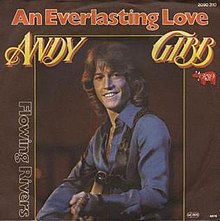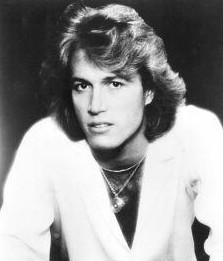
Andrew Roy Gibb was an English-Australian singer and songwriter. He was the younger brother of Barry, Robin, and Maurice Gibb, musicians who had formed the Bee Gees during the mid-1960s. Gibb came to prominence in the late 1970s through the early 1980s with eight singles reaching the Top 20 of the US Hot 100, three of which went to number one: "I Just Want to Be Your Everything" (1977), "(Love Is) Thicker Than Water" (1977), and "Shadow Dancing" (1978). In the early 1980s, he co-hosted the American music television series Solid Gold. He also performed in a production of The Pirates of Penzance and Joseph and the Amazing Technicolor Dreamcoat. Gibb would later struggle with drug addiction and depression. He died on 10 March 1988, five days after his 30th birthday.

"Night Fever" is a song written and performed by the Bee Gees. It first appeared on the soundtrack to Saturday Night Fever on RSO Records. Producer Robert Stigwood wanted to call the film Saturday Night, but singer Robin Gibb expressed hesitation at the title. Stigwood liked the title Night Fever but was wary of marketing a movie with that name. The song bounded up the Billboard charts while the Bee Gees’ two previous hits from Saturday Night Fever soundtrack were still in the top ten. The record debuted on the Billboard Hot 100 Chart at #76, then leaped up 44 positions to #32. It then moved: 32–17–8–5–2–1. It remained at #1 for eight weeks, and ultimately spent 13 weeks in the top 10. For the first five weeks that "Night Fever" was at #1, "Stayin' Alive" was at #2. Also, for one week in March, Bee Gees related songs held five of the top positions on the Hot 100 chart, and four of the top five positions, with "Night Fever" at the top of the list. The B-side of "Night Fever" was a live version of "Down the Road" taken from the Bee Gees 1977 album, Here at Last... Bee Gees... Live.
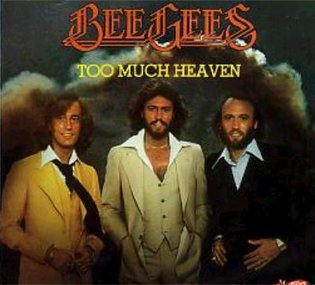
"Too Much Heaven" is a song by the Bee Gees, which was the band's contribution to the "Music for UNICEF" fund. They performed it at the Music for UNICEF Concert on 9 January 1979. The song later found its way to the group's thirteenth original album, Spirits Having Flown. It hit No. 1 in both the US and Canada. In the United States, the song was the first single out of three from the album to interrupt a song's stay at #1. "Too Much Heaven" knocked "Le Freak" off the top spot for two weeks before "Le Freak" returned to #1 again. "Too Much Heaven" also rose to the top three in the UK. In the US, it would become the fourth of six consecutive No. 1s, equalling the record set by Bing Crosby, Elvis Presley, and the Beatles for the most consecutive No. 1 songs. The six Bee Gee songs are "How Deep Is Your Love", "Stayin' Alive", "Night Fever", "Too Much Heaven", "Tragedy" and "Love You Inside Out". The songs spanned the years of 1977, 1978 and 1979.

"Love You Inside Out" is a 1979 single by the Bee Gees from their album, Spirits Having Flown. It was their last chart-topping single on the Billboard Hot 100, interrupting Donna Summer's "Hot Stuff", becoming the third single from the album to do so. In the UK, the single peaked at No. 13 for two weeks. It was the ninth and final number-one hit for the Bee Gees in the US, and the twelfth and final number-one hit in Canada as well. The trio would not return to the top 10 for ten years, with the song, "One".
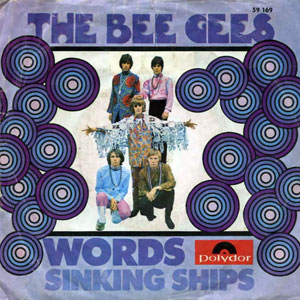
"Words" is a song by the Bee Gees, written by Barry, Robin and Maurice Gibb. The song reached No. 1 in Germany, Canada, Switzerland, and the Netherlands.

"How Deep Is Your Love" is a pop ballad written and recorded by the Bee Gees in 1977 and released as a single in September of that year. It was ultimately used as part of the soundtrack to the film Saturday Night Fever. It was a number-three hit in the United Kingdom and Australia. In the United States, it topped the Billboard Hot 100 on 25 December 1977 and stayed in the Top 10 for 17 weeks. It spent six weeks atop the US adult contemporary chart. It is listed at No. 27 on Billboard's All Time Top 100. Alongside "Stayin' Alive" and "Night Fever", it is one of the group's three tracks on the list. The song was covered by Take That for their 1996 Greatest Hits album, reaching No. 1 on the UK Singles Chart for three weeks.

Barbra Streisand is an American actress and singer. Her discography consists of 118 singles, 36 studio albums, 12 compilations, 11 live albums, and 15 soundtracks. According to the Recording Industry Association of America, Streisand is the second-best-selling female album artist in the United States with 68.5 million certified albums in the country, and a career total ranging from 150 to 200 million making her one of the best-selling music artists of all time.

"Woman in Love" is a song performed by Barbra Streisand and taken from her 1980 album Guilty. The song was written by Barry and Robin Gibb of the Bee Gees, who received the 1980 Ivor Novello award for Best Song Musically and Lyrically. It is her fourth of four Platinum records, and is considered her greatest international hit.
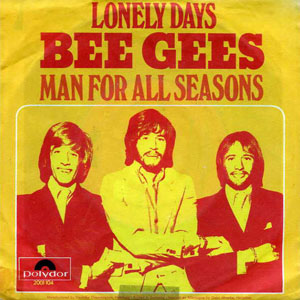
"Lonely Days" is a ballad written and performed by the Bee Gees. It appeared on their album 2 Years On, and was released as a single, becoming their first Top Five hit in the US, peaking at number three in the Billboard Hot 100 and reaching number one in the Cashbox and Record World charts. Barry Gibb later re-recorded the song with country quartet Little Big Town for his 2021 album Greenfields.

"(Love Is) Thicker Than Water" is a song performed by Andy Gibb, released in September 1977 as the second and final single by RSO Records from his debut album, Flowing Rivers (1977). The song was his second single that topped the US Billboard Hot 100. It was mainly written by Barry Gibb, with help from Andy Gibb and produced by Gibb-Galuten-Richardson. The B-side of this song was "Words and Music" in the US, but "Flowing Rivers" in the UK. It became a gold record.

"Shadow Dancing" is a disco song performed by English singer-songwriter Andy Gibb. The song was released in April 1978 as the lead single by RSO Records from his second studio album of the same name. The song reached number one for seven consecutive weeks on the Billboard Hot 100 in 1978. It was written by Andy and his older brothers, Barry, Maurice and Robin Ribb and Albhy Galuten arranged the song with Barry Gibb. While Andy Gibb would have three more Top 10 hits in the U.S., this would be his final chart-topping hit in the United States. The song became a platinum record.

"I Just Want to Be Your Everything" is a song recorded by Andy Gibb, initially released in April 1977 by RSO Records as the first single from his debut album Flowing Rivers (1977). The song was written by Gibb's older brother Barry, and produced by Gibb-Galuten-Richardson. It reached number 1 on the Billboard Hot 100 for three weeks, starting on the week ending 30 July 1977, and again for the week ending 17 September 1977. It was Gibb's first single released in the United Kingdom and United States. His previous single, "Words and Music" was only released in Australia. It is ranked number 26 on Billboard's 55th anniversary All Time Top 100.

"Mr. Natural" is a song by the Bee Gees, written by Barry and Robin Gibb. On 29 March 1974, it was released as a single and also released on the album of the same name in 1974. It was backed with a folk rock number "It Doesn't Matter Much to Me". The group's first single which was produced by Arif Mardin.

"Run to Me" is a song by the Bee Gees, the lead single from the group's album To Whom It May Concern (1972). The song reached the UK Top 10 and the US Top 20.

"Never My Love" is a pop standard written by American siblings Don and Dick Addrisi, and best known from a hit 1967 recording by the Association. The Addrisi Brothers had two Top 40 hits as recording artists, but their biggest success as songwriters was "Never My Love". Recorded by dozens of notable artists in the decades since, in 1999 the music publishing rights organization Broadcast Music, Inc. (BMI) announced it was the second most-played song on radio and television of the 20th century in the U.S.

"If You Love Me (Let Me Know)" is a song written by John Rostill that was a 1974 hit single for Olivia Newton-John. It was her second release to hit the top 10 in the United States, reaching number 5 on the pop chart and number 2 on the Easy Listening chart. It also reached number 2 on the Billboard country chart. As with her single "Let Me Be There", Mike Sammes sings a bass harmony. It was nominated for the 1974 Country Music Association Award for Single of the Year.
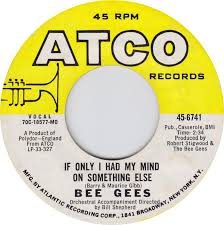
"If Only I Had My Mind on Something Else" is a pop ballad recorded by the Bee Gees. It was written by Barry and Maurice Gibb. It was the first track on the album Cucumber Castle. A remastered version was released in 1990 on Tales from the Brothers Gibb.

"Fanny (Be Tender with My Love)" is a song written and performed by the Bee Gees for their Main Course album in 1975. It was the third single release from the album, peaking at number 12 on the United States Billboard Hot 100 and number two in Canada. According to Maurice Gibb, producer Quincy Jones called "Fanny" one of his favorite R&B songs of all time.

"(Our Love) Don't Throw It All Away" is a song penned by Barry Gibb and Blue Weaver and recorded by the Bee Gees in 1977 on the Saturday Night Fever sessions but was not released until Bee Gees Greatest (1979). A different version was released in September 1978 by RSO Records as the third single by Andy Gibb from his second studio album Shadow Dancing. His version was produced by Gibb-Galuten-Richardson.

"Time Is Time" is a song written by Andy and Barry Gibb. Andy Gibb performs this song and was released as a single in November 1980 and included on Andy Gibb's Greatest Hits. The B-side, "I Go for You" was originally from his 1978 album Shadow Dancing.
